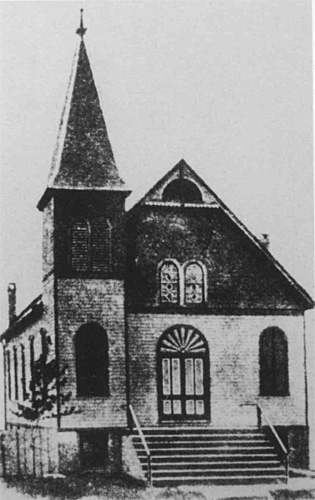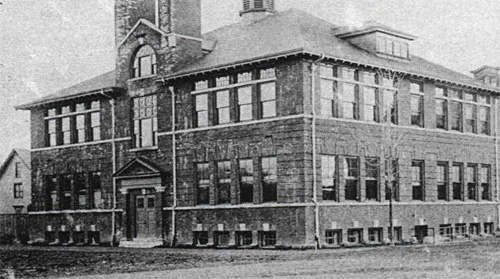Becoming Paul Robeson
When Paul Robeson rose to speak at his 8th-grade graduation, he was ready.
A year earlier the 13-year-old had moved roughly 20 miles from Westfield to Somerville, New Jersey, with his father, William, the new pastor of the borough’s St. Thomas A.M.E. Zion Church. A former slave with two master’s degrees, William was also a first-class orator who had taught Paul how to speak publicly. And, indeed, two local newspapers would report that Paul wowed the audience.

Paul Robeson on the Somerville High School football team (Photo: Courtesy of Raritan-Online.Com)
He had also chosen a provocative speech to showcase his oratorical prowess – Patrick Henry’s famous 1775 call to arms, which ends with: “I know not what course others may take; but as for me, give me liberty or give me death!”
It was 1911. Paul had spent 10 years watching his father, a model of perseverance, regain his footing after losing a Presbyterian pastorship in Princeton. Now, it was Paul’s turn to become his own man.
“Everything for which he’d later be famous – singing, oratory, athletics, acting – the first time we have evidence of him doing it was in Somerville,” says Randall Westbrook, a 30-year resident of the borough and part-time lecturer in the Department of Africana Studies at Rutgers University-New Brunswick. “And that speech was a very interesting departure from what most people were used to.”
“Everything for which he’d later be famous – singing, oratory, athletics, acting – the first time we have evidence of him doing it was in Somerville.” – Randall Westbrook

It was also symbolic of the Robesons’ newfound liberation. The graduation ceremony took place in St. Thomas, which, unlike Rev. Robeson’s Princeton parish, was black-owned and “one of the largest A.M.E. Zion churches in New Jersey,” Westbrook says. While still in Princeton, William had been appointed pastor of a new A.M.E. Zion church in Westfield that he literally built from scratch. His post at St. Thomas “was a promotion and a complete vindication for him,” Westbrook adds.
Somerville had an integrated high school, a rarity during the Jim Crow era. Rare as well was William’s expectation that all five of his children attend college. But Paul’s four older siblings either had or were doing just that. And Paul, who’d lost his mother to a house fire at age 5, was well on his way, earning As and excelling at football, baseball and basketball at Somerville High. He was also on the debate team, an editor of the school newspaper and a member of the glee and drama clubs.
Among his mostly white classmates, Paul was also popular, in part because he didn’t flaunt his talents. But he wasn’t immune to bigotry. Playing sports, for example, he was taunted by rival teams, and he avoided school dances because, as he wrote in his 1958 autobiography, Here I Stand, “There was the feeling that – well, something unpleasant might happen.”
It was like walking a tightrope, realizing one’s potential while not upsetting the Jim Crow social order. But like his father, Paul didn’t completely suppress his proclivities, including a sometimes-wicked sense of humor. After rehearsing an otherwise innocuous scene from Julius Caesar, for example, Paul and a classmate played a prank during the actual performance. When Paul, as Mark Antony, pulled a sheet back to reveal Caesar’s corpse, it was covered unexpectedly in blood—or, actually, ketchup. Shocked at first, the audience broke into applause.
During his senior year, Paul took an exam that earned him a four-year scholarship to Rutgers. Although his father and brother Bill had attended the historically black Lincoln University outside of Philadelphia, Paul had two reasons for not following suit. “First was money; it was very tight,” Westbrook says. “Second, Paul’s father’s health was starting to fail.” And Rutgers was just 14 miles away, in New Brunswick.

It was at Rutgers that a statewide oratorical contest for high schoolers was held during Paul’s senior year. Taking third place, he didn’t do as well as he’d hoped, and perhaps the material was to blame. He recited a speech originally given by a white abolitionist during the Civil War, a tribute to Toussaint Louverture, the black leader of the Haitian Revolution in the late 1700s.
“This kid who starts out using Patrick Henry is now using Toussaint Louverture,” Westbrook says, with a laugh. “Who will he use next – Nat Turner?”
Not quite. But as a student at Rutgers, Paul would deliver yet another memorable speech – his own.
Rutgers is honoring Paul Robeson’s legacy as a scholar, athlete, actor, singer and global activist in a yearlong celebration to mark the 100th anniversary of his graduation. Check back with Rutgers Today throughout the year as we present a special series chronicling Robeson’s life and his influence on generations. Read the previous article: Lessons from Paul Robeson's Father. Check back for the next in our series on Robeson's experience as a first-year student at Rutgers where he distinguishes himself on the gridiron.
Learn more about the celebration by visiting robeson100.rutgers.edu or by following #Robeson100 on social media.